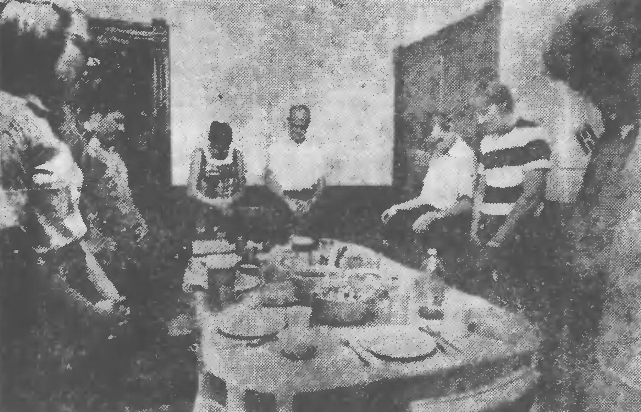![]()
The Words of the Lejeune Family
|
|
The Words of the Lejeune Family |

Prayer
precedes meal for Unification 'family' at 127 Dwight St. house. From
the left, Mary Mattke, Greg Kobel, Hal McKenzie, Kathie French,
Edward Haskell, Bob Douglas, John Meloling, Paul Yasataki and Judie
Culbertson.
A group of brighter-than-average young adults -- who don't smoke, drink, or use drugs -- are living together as a "family," in at 127 Dwight St.
The group is bound together by commitment to the idea that the common principle of the great religions of the world can be the basis of a new unity for mankind.
In an old-fashioned dining room, a Korean flag with the Tao symbol on the wall, the table laden with five plates stacked with fresh cookies ("we make them to sell"), Judie Culbertson, 27, explained the "Unification Family," which she said is the "youth thrust" of the-half-million-member world Church of the Unification, founded by South Korean Sun Myung Moon in 1951 when he was 31 years old.
Miss Culbertson said the family living arrangement is geared to the religious interest of the group.
It is not a commune, but has the purpose of study and spiritual growth." She said the Unification teaching that sex should be reserved for marriage is observed, but that the group's attitude is not judgmental toward those who have other lifestyles.
"Emphasis is no idea that as one grows in ability to apply the principles for living purposeful and fulfilling life he is able to rise above the craving psychology."
As for civilization, Unification is for it. "We are not escapist about mankind's problems," Miss Culbertson said. "We are concerned about racial brotherhood, dealing with the problems of drug abuse, and ecology-the whole matter of renewing the world."
The group finds "growing in understanding" and in ability to articulate Unification principles so engrossing that life in the house moves along without a dull moment.
In residence are Judie, Glenn Strait, Neil Winterbottom, Mary Mattke, Kathie French, Paul Yasataki, Greg Kobel and Hal McKenzie. Bob Douglas lives away from the house.
Every Monday night there is a study session where Bible or some other world religious literature is read and discussed.
Everyone pitches in and helps with the house chores. They keep their own private property, but those who work contribute most of their wages to the common maintenance fund.
They take turns planning worship experiences for Sunday, often, when the weather is good, up beside a big rock on West Rock's summit. But they have informal worship every day.
In worship they share insights informally, sometimes bring symbols of things dear to them and offer them to God with prayers they compose themselves, or borrow from various religions. Their handbook is a volume called "The Divine Principle and Its Application." Though open to insights from any faith, the "general flavor" of the emphasis comes from Christianity, which was the faith in which the founder was reared.
"Our whole belief is worship, Judie said," as we try to align ourselves with God."
The organization has no clergy as such, but there are some paid full-time administrators in the larger centers, which are in Los Angeles, Denver, Washington, D. C. and New York. In Washington three houses are linked together.
Some of the members have had drug backgrounds. Some come from bad home situations and find the idea of the "family" an answer to a void in their lives. But others have had good family backgrounds and no such problems.
"Every person is different, and we try to recognize this at all times. Some are of the head, some of the heart, some once born, some twice born."